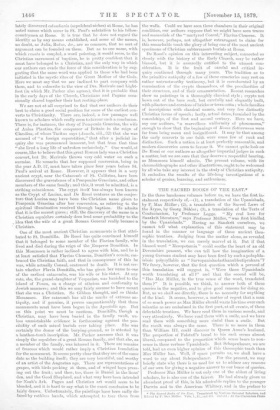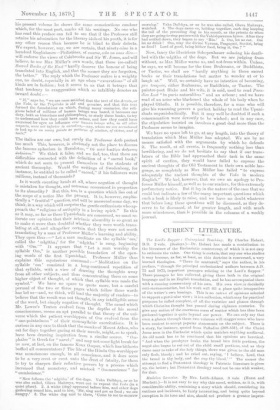THE SACRED BOOKS OF THE EAST.*
IN the three handsome volumes before us, we have the first in- stalment respectively of,—(1), a translation of the Upanishads, by F. Max Muller ; (2), a translation of the Sacred Laws of the Aryas, by Georg Biihler ; (3), a translation of the Texts of Confucianism, by Professor Legge. "My real love for Sanskrit literature," says Professor Miller, "was first kindled by the Upanishads." Having no Sanskrit ourselves, we cannot tell what explanation of this statement may be found in the manner or language of these ancient thee- sophic treatises. Judging from the matter alone, as revealed in the translation, we can. merely marvel at it. But if that blessed word " Mesopotamia " could soothe the heart of an old Devonshire peasant, who can tell how the imagination of a young German student may have been fired by such a poluphlo- ishoic polysyllable as " Sarvopaniehadarthanubhutiprakara"? We fancy, however, that the first question which a perusal of this translation will suggest is, "Were these Upanishads worth translating at all ?" and that the second will be, "Has Max Muller, in the true sense of the word, translated them ?" It is possible, we think, to answer both of these queries in the negative, and to give good reasons for doing so. But, as we shall see directly, there is no necessity for anything of the kind. It seems, however, a matter of regret that a man of so much power as Max Miller ehoulcl waste his time over such minutise as are embalmed in the first part, at all events, of these delectable treatises. We have read them in various moods, and very attentively. We have read them with a smile, and we have read them with something more sinful than a smile. But the result was always the same. There is no more in them than William III. could discover in Queen Anne's husband. The proportion of Falstaff's bread to his sack seems almost liberal, compared. to the proportion which sense bears to non- sense in these verbose Upanishads. But Schopenhauer, we are told, had. an even higher opinion of this theosophic trash than Max MUller has. Well, if space permits us, we shall have a word to say about Schopenhauer. For the present, we may briefly state why there is no need for us to adduce any reasons of our own for giving a negative answer to our brace of queries.
Professor Max Miller is not only one of the ablest of living scholars, he is also one of the fairest. He had already given us abundant proof of this, in his admirable replies to the younger Darwin and to the American Whitney, and in the preface to
* The Sacred Reeks .1 the Emr. Tritnelsted by Various Oriental Scholars, and Edited by F. Max Millet'. Vole. 1., ii.,And 111. Oxford: At the Olsrondon Press his present volume he shows the same conscientious candour which, for the most part, marks all his writings. No one who has read this preface can fail to see that if the Professor still retains his admiration for the literary idols of his youth, it is for any other reason than because he is blind to their defects. We expect, however, nay, we are certain, that ninety-nine in a hundred Englishmen—Philistines, of course, cela va sans will endorse endorse the views of Colebrooko and Sir W. Jones, and will believe, to use Max Miller's own words, that those (so-called) Saored Books of the East "hardly deserve the honour of being translated into English, and that the sooner they ate forgotten, the better." The reply which the Professor makes is a weighty one, no doubt, especially in an age when " excavations " of all kinds are in fashion ; but it seems to us that it betrays that that tendency to exaggeration which so infallibly denotes an inward doubt :— "If," says he, "we are once satisfied that the text of the Avesta, or the Veda, or tho Tripitaka is old and genuine, and that this text formed the foundations on which, during many centuries, the reli- gions belief of millions of human beings was based, it becomes our duty, both as historians and philosophers, to study these books, to try to understand how they could have arisen, and bow they could have exorcised for ages an influence over human beings who, in, all other respects, were not inferior to ourselves,—nay, whom we are accustomed to look up to on mttng points as patterns of wisdom, of virtue, and of taste."
The italics are our own, but surely the Professor doth protest too much This, however, is obviously not the place to discuss the famous aphorism in Herodotus, " liarsipEt layilperror cipophooti." We think it false, and we feel, too, that there are difficulties connected with the definition of a "sacred book," which do not seem to present themselves to the students of
ancient theosophy. Would the writings of Swedenborg, for instance, be entitled to be called "sacred," if his followers were millions, instead of thousands P Is it worth counting heads at all, where negation of thought is mistaken for thought, and nonsense reverenced in proportion to its absurdity P But this, too, is a question which lies out of the scope of a notice like the present. It is, however, empha- tically a " fruitful " question, and will be answered some day, we think, in a way which will surprise the gentle enthusiasts who ap- proach the "religions of antiquity in a loving spirit." Be this as it may, so far as these Upanishads are concerned, we must re- iterate our opinion that their intrinsic absurdity is so great as to make it more than doubtful whether they were worth trans- lating at all, and altogether certain that they were not worth translating by a man of Professor Mailer's learning and ability. They open thus :—" Let a man meditate on the syllable ' om,' called the ud.githa;' for the adgitha ' is sung, beginning with 'Om.'" It appears that "Let a man worship the syllable Om," is another possible translation of the open- ing words of the first Upanishad. Professor Miller thus explains this mysterious command Meditation on the
syllable om ' consisted in a long-continued repetition of that syllable, with a view of drawing the thoughts away
from all other subjects, and thus concentrating them on some higher object of thought, of which that syllable was made the symbol." We have no space to quote more, but a careful perusal of the two or three Pages which follow those words has led us—and, we think, will lead the majority of readers—to believe that the result was not thought, in any intelligible sense of the word, but simply negation of thought. The camel which Mr. Lewes's Teuton evolved from the depths of his moral consciousness, seems an apt parallel to that theory of the uni-
verse which the patient worshippers of Om evolved from the " one-pointedness " of their monosyllabic oxercitations. It is
curious in any case to think that the monks of Mount Athos, who sat for days together gazing at their navels, might, so to speak, have been drawing inspiration from a similar source. " Om- phalos " is Greek for " navel ;" and may not some light break for us now, at last, on the famous Kottx Ompax, which has hitherto baffled all commentators P The life of the Hindu Om-worshipper was monotonous enough, in all conscience, and it does seem to be a very crest or crest unto the Crest of fatuity, for them to try to sharpen their reflective powers by a process which increased that monotony, and tuistook " Ont-nescience " for "omniscience."
"Now follows the udgitha' of the dogs. Vaka Dalbhya, or as he was also called, Glava Maitreya, went out to repeat the Veda (in a quiet place). 2. A white (dog) appeared before him, and other dogs gathering round him, said to him, 'Sir, sing and got us food ; we are hungry.' 3. The white dog said to them, 'Come to me to-morrow morning.' Poke. Dalbliya, or as he was also called, Glava Maitreya, watched. 4. The dogs came on, holding together, each dog keeping the tail of the preceding dog in his month, as the priests do when they are going to sing praises with the Vahishpavama hymn. After they had settled down, they began to say Hin.' 5. Om, let us eat. On let us drink ! Om, may the divine Varuna, Pragapati, Savitri, bring us food ! Lord of good, bring hither food, bring it, Om !' "
Now, fancy the illustrious Schopenhauer solacing his death- bed with the udgitha of the dogs. But we are judging from without, as Max Muller warns us, and not from within. Unless,
he says, we will become for the time Brahmans, or Buddhists, or Taotze, we shall see "hardly anything in these sacred books or their translations but matter to wonder at or to laugh at." Well, we certainly have no intention of becoming, pro tempore, either Brahmans, or Buddhists, or Taotze. The painter-poet Blake and his wife, it is said, used to read Para- dise Lost "in pulls naturalibus " and an arbour ; and we have read of an actor who blackened the whole of his body when he played Othello. it is possible, therefore, for a man who will
give his reasoning powers a perfect holiday to read the Upani- shads unpanishadically. But it may well be doubted if such a consummation were devoutly to be wished ; and in any case, the stipulation insisted on involves a great deal more than the Professor seems to imagine.
We have no space left to go, at any length, into the theory of translation which Max Miller has adopted. We are by no means satisfied with the arguments by which he defends it. The result, at all events, is frequently nothing less than
bewildering, and we do not hesitate to say that if our trans- lators of the Bible had approached their task in the same spirit of caution, they would have failed to express the ancient thoughts of the Old Testament in their own noble lan- guage, as completely as Max Muller has failed "to express adequately the ancient thoughts of the Veda in modern English." We feel, however, that we owe an apology to Pro- fessor Miiller himself, as well as to our readers, for this extremely perfunctory notice. But it layin the nature of the case that we could but indicate a few of the many important questions which such a book is likely to raise, and we have uo doubt whatever that before long these questions will be discussed, as they de. serve to be discussed, at far greater length, and with much more minuteness, than is possible in the columns of a weekly journal.



































 Previous page
Previous page